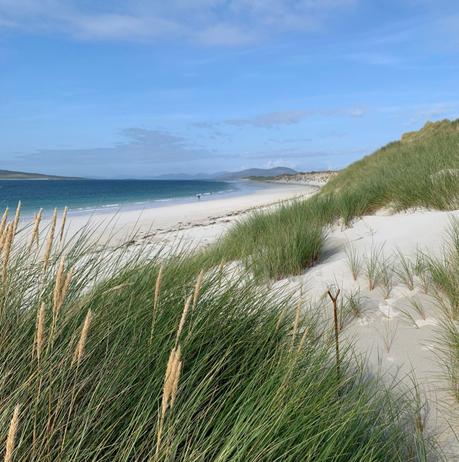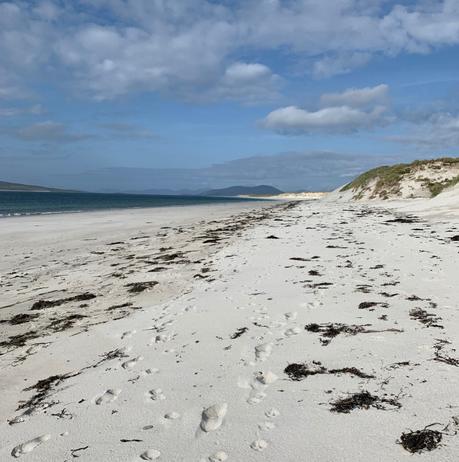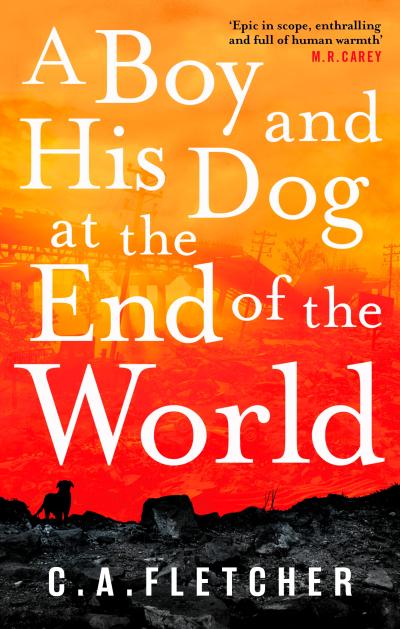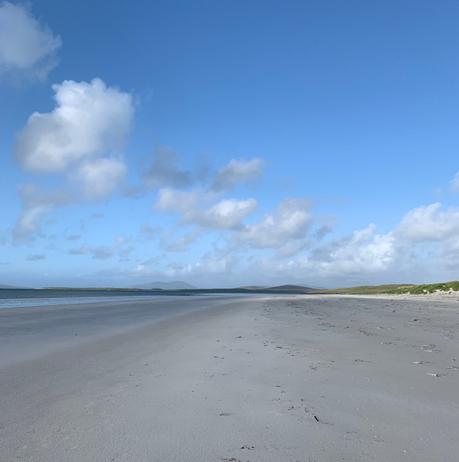 This is the first time a post has appeared on the blog when I’m not officially ‘here’ (on the Sofa or on Twitter). Normal service will resume next week but for anyone who needs a late summer away-from-it-all trip, today I’m hosting a Writers on Location on the Outer Hebrides, a setting I was keen to add to the broad mix featured in this long-running series. My guest Charlie (C A) Fletcher has a deep personal connection with the place where his novel A Boy and his Dog at the End of the World begins and I’m delighted to receive a visit from him and his lovely dog. One of my Summer Reads choices, it’s newly out in paperback and as my review at the end proves, its good reception hasn’t been limited to dog lovers and fans of speculative fiction.
This is the first time a post has appeared on the blog when I’m not officially ‘here’ (on the Sofa or on Twitter). Normal service will resume next week but for anyone who needs a late summer away-from-it-all trip, today I’m hosting a Writers on Location on the Outer Hebrides, a setting I was keen to add to the broad mix featured in this long-running series. My guest Charlie (C A) Fletcher has a deep personal connection with the place where his novel A Boy and his Dog at the End of the World begins and I’m delighted to receive a visit from him and his lovely dog. One of my Summer Reads choices, it’s newly out in paperback and as my review at the end proves, its good reception hasn’t been limited to dog lovers and fans of speculative fiction.
I suspect everybody who travels has their own ‘last good place’. Mine’s the Outer Hebrides, the breathtakingly beautiful and wild islands off the northern coast of Scotland. I fell in love with (and on) Harris the very first time I visited them as a young and callow student, and their spell hasn’t relaxed its grip yet. Partly it’s the objective charms of the islands – the stark grandeur, the strangely comforting lonely timelessness of the unpeopled land and sea-scape – but it’s also the subjective experience of those charms, the memories of the good times had there and the friends, family and dogs with whom those times have been shared.

It’s like something my father said to me when my childhood dog died. He said that you may be lucky enough to get more, but you are guaranteed to get two truly great dogs in your life: the one you grow up with, and the one you watch your children grow up with. That certainly turned out to be true for me: the dog Jip in A Boy and his Dog at the End of the World is really Archie, the black-and-tan terrier that ran all the way through my kids’ childhoods. As with dogs, so with islands: having fallen for them in my teens, I’ve been coming back all my adult life. My wife conveniently shares that love – and that of dogs – having had her own youthful Hebridean experiences on the more southerly island of Tiree. We’ve seen our kids grow to adulthood on beaches first visited when we were younger than they now are. And though you never know how much of what you’d wish to pass on to the next generation actually gets through, a love of the wild and empty beaches of the Western Isles is one thing I know we’ve infected them with. It’s not accidental that the islands, dogs and family are such strong elements in the book.
For about 15 years the family summer holidays have been spent in the same house on North Uist. It’s the house in which – long after the soft apocalypse that has almost entirely depopulated the world of the book – Griz finds the hidden lair under the billiard table, and discovers the faded photograph of the long dead boy, the imaginary friend from the almost unimaginable past to whom the whole story is addressed. It’s a solid old stone-built farmhouse that has spread over the years and will, I think, stay on its feet for a longish while after the human population has fallen away.

The future is a lonely place in the world of the book: the current global population– 7 billion and change – is a distant memory, following an event known as The Gelding in which everyone except 0.001% of humanity simply lost the ability to reproduce. Griz’s family are part of the maybe 7,000 humans who remain, spread out over the whole planet. Griz’s ancestors withdrew to the islands on the edge of our dying world so as not to rub their youth and the ability to have children in the face of the aging and now childless generation, the Last Born (or the Baby Bust, as the more ironic amongst them called themselves).
A couple of generations down the line in a post-industrial world, an island life makes as much sense as it did in the pre-industrial: the mainland is unpopulated and overgrown, the roads lost, the cities fallen into ruins that nature is swiftly reclaiming. The seaways are again a faster and clearer means of travel than the land, just as they were in the past when these seemingly far flung outposts of humanity were actually the center of a great trade route linking Scandinavia and Ireland during the roughly 600 years of Viking rule over the islands.
In the world of the story Griz follows a stranger who visits the family’s home island of Mingulay and steals one of the dogs. Griz chases him out of the familiar island landscape into the ruins of our more crowded mainland existence and sees with un-jaded eyes the wonder of what has been lost, the unconsidered everyday miracles of our world that we take for granted.
I blame all those years of walking and swimming on the islands. They’ve given uncountable opportunities to look about and recharge by immersing myself in a landscape that seems unchanged since the dawn of history: I wrote the book in part to turn that perspective around and look back from that point of timelessness into our busy civilization and see what of value might remain of us once we are almost gone. Turns out it’s family and resilience and resourcefulness – and above all loyalty to the things we love. Like dogs.
Thanks to Charlie for this evocative post which conveys his love of the Outer Hebrides and the way the islands inspired his novel so eloquently. I’ve never been further north than Inverness but I really want to now!

It always seems significant if a book can win over readers outside its natural audience, as this novel did with me. I do like dogs but have never owned one as an adult, and whilst I have read a good few speculative/post-apocalyptic novels, this isn’t a genre I gravitate towards. Interesting that it’s becoming more popular and mainstream when for many people the current state of the world is enough to contend with – but maybe that’s why. The best of those novels make us look at our own lives and environment from a different perspective. There is an elegiac quality to the ideas behind this vivid work of imagination and their expression; it’s inevitably sad in a context dominated by loss, but also beautiful and insightful in a similar – but also entirely different way – to Emily St John Mandel’s Station Eleven. I found it very moving.
Most of that comes down to Griz, an easy character to care about. He needs to be, facing even greater pressure than most first-person narrators, as for huge stretches of the story he has no contact with any other human being, which casts the reader as quasi-companion (and at times, very concerned adult). Fletcher largely gets round the challenges this degree of isolation and introspection would usually pose to pace – despite a slight dip in the middle the book shares enough of the features of a ‘quest’ and ‘road trip’ to remain compelling, the poignant bond between Griz and dog Jip as the bedrock. This isn’t an easy book to review as some of the most interesting angles have to remain under wraps but it would fuel discussion with other readers with the ‘big questions’ it raises about life as we know it and what vestiges would be remain if we were all gone.


